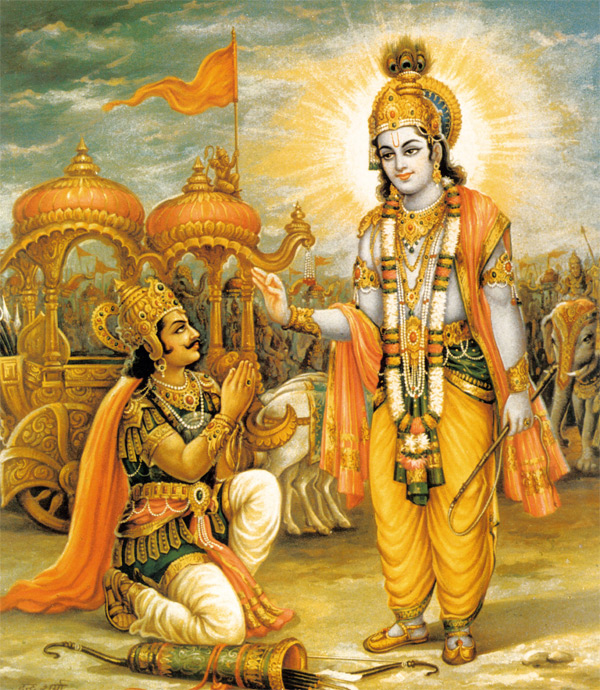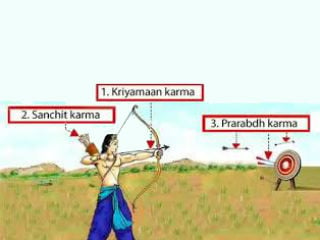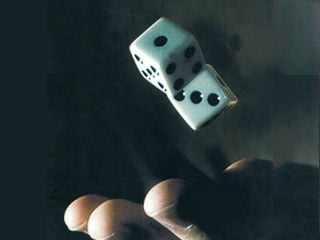
At the very commencement of the battle (of Mahabharat) Arjun sees that his own relatives and friends are his enemies. Seeing them, Arjun is confused and, under the guise of renunciation, decides not to abide by the duty of a Kshatriya (Warrior), that is, fighting on the battlefield. ‘Renunciation is better than fighting’ he proclaims. His intellect is deluded because of the emotion of love, and as a result, he wrongly perceives the concept of Yudhha-karma (Duty in war) that is prescribed by the scriptures for the Kshatriyas. – From ‘Shrimadbhagwadgeeta, Adhyaya 3’ written by Gurudev Dr Kateswamiji.
1. Which is superior – Dnyanyoga (Path of knowledge) or Karmayoga ?
‘After hearing about Sankhyayoga (Yoga of Knowledge) and Buddhiyoga (Yoga of Intellect), a question arose in Arjun’s mind, ‘If intellect is superior to karma, why is Shrikrushna encouraging me to perform this terrible karma ?’ Since Arjun could not comprehend the doctrine of ‘Naishkarmya (Detachment from karma) while continuing to perform karma’, Shrikrushna clarifies Karmayoga to him, quoting the example of King Janak. He elaborates on the importance of karma and knowledge. Arjun interprets this as, ‘I have the option of choosing between dedication towards karma or knowledge.’ He also feels that Dnyanyoga is superior, and as such why should anyone accept Karmayoga at all ?’. Arjun said, “O Krushna, You acclaim renunciation of karma, and again, (at other times) Karmayoga. Which is the better one of these ? Do tell me decisively.”
2. Clarification of doubts by Shrikrushna
A. Shrikrushna explained the doctrine of
Karmayoga to Arjun to fulfill the duty of a Guru
Arjun’s antahkaran is perturbed by doubts, constructive-destructive alike. He asks God, “O Shrikrushna, I am utterly confused. You insist that I participate in the battle. It is for this reason that you are trying to influence me with the concept of nishkam Karmayoga, is it not ?” Shrikrushna’s face shows signs of disturbance. He replies, “No, Arjun, this is incorrect. You have taken refuge in Me, you have surrendered unto Me. I am attempting to present before you the philosophy of an articulate way of life that will successfully fulfill the mission of your life. Can a Guru ever hide anything from a disciple who has surrendered unto Him wholeheartedly? Now there is nothing that cannot be given to you. My effort is to make you aware of a way of life which is extremely gratifying, stable and peaceful.”
B. Kindness, forgiveness, and compassion are benevolent bhav,
but if they are awakened in the wrong situation, they become malevolent
Bhav of kindness, forgiveness and compassion arose in Arjun’s mind on the battlefield. This bhav are not benevolent; but their awakening on the battlefield is incorrect. Hence, to become aware of this unknown sorrow arising from ignorance, God imparted knowledge to Arjun.
C. It is essential to follow swadharma
(One’s own Dharma; that is duty of a Kshatriya)
‘Before the Mahabharat battle, Kouravs had done injustice to the Pandavs. Despite this, Arjun, out of attachment for the Kouravs, forgot his duties and said that he would not fight the Kouravs. In reality, the battle was justified by the scriptures and was in keeping with his duties. Yet, Arjun questioned, “Will I not beget demerit of killing Gurus and Brahmans if I fight this battle ?” In reply to this doubt, Shrikrushna said, “There is no reason to fear while abiding by swadharma. For a Kshatriya, there is no duty more meritorious than fighting a Dharmayuddha (Battle for Dharma). ‘Whosoever comes forward with the intention to combat, wage a battle against him’ – that is what the Kshatriya-Dharma is all about. A Kshatriya should never flee from the battlefield. Protection of the society and safeguarding of the earth in a righteous manner are the prime duties of a Kshatriya.” – Shrimadbhagwadgeeta, 2.31
D. Since Arjun was not capable of karma-tyag (Renunciation of karma)
and karma-sanyas, Shrikrushna evoked Kshatravrutti (Attitude of a warrior) in him
‘Arjun was an extrovert, a Kshatriya. Shrikrushna reasoned that Arjun was not capable of sustaining karma-tyag and karma-sanyas. Whoever cannot give up desire can never sustain karma-sanyas. Even if Arjun renounces karma, his desires and ambitions will not subside. The blood of a warrior in him will flow. Whenever an opportunity arises, his Kshatratej (Radiance of a Warrior) will manifest, the weapon will strike. How, then, is this warrior attitude going to subside ? For this reason, it is beneficial that Arjun performs nishkam-karma and abides by swadharma. While continuing to perform nishkamkarma day after day, a time will arrive when karmas will automatically cease. Then the issue of whether or not to perform karmas will cease to exist. The final milestone on the path of nishkamkarma is karma-sanyas.’- Gurudev Dr Kateswamiji.
E. It is a duty to annihilate a person who attacks you with the intention to kill
Arjun asks, “O Shrikrushna, the scriptures advise not to kill a jiva (Embodied soul), to avoid violence, never to kill a Brahman”. Shrikrushna replies, “If a Guru, child, elderly person or a Vaidik (Well-versed in one of the four Vedas) Brahman holding a weapon attacks like an enemy, as a reckless assailant with the intention to kill, then indeed he should be annihilated. That itself is Dharma”.
Shrikrushna advises Arjun, “Your right is restricted to merely performing karma, and not to expect the fruit. Do not perform karma with the expectation of fruit. At the same time, do not even insist on not performing karma”. – Shrimadbhagwadgeeta, 2.47

 Using Kriyaman-karma effectively
Using Kriyaman-karma effectively Importance of Kriyaman-karma in overcoming Prarabdha-karma
Importance of Kriyaman-karma in overcoming Prarabdha-karma How to overcome sufferings of Prarabdha
How to overcome sufferings of Prarabdha Facing the consequences of Prarabdha
Facing the consequences of Prarabdha What is Sanchit-karma and Prarabdha?
What is Sanchit-karma and Prarabdha? Kartavya (Duty) karma
Kartavya (Duty) karma